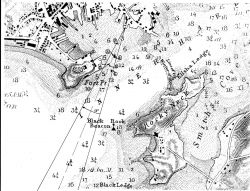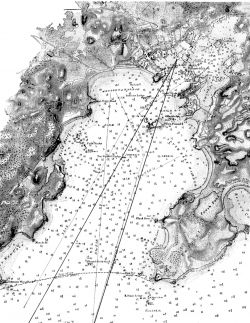loading 
Fitz Henry Lane
HISTORICAL ARCHIVE • CATALOGUE RAISONNÉ • EDUCATIONAL RESOURCE
An online project under the direction of the CAPE ANN MUSEUM
An online project under the direction of the CAPE ANN MUSEUM
Catalog entry
inv. 44
Ships in Ice off Ten Pound Island, Gloucester
1850s Oil on canvas 12 1/8 x 19 3/4 in. (30.8 x 50.2 cm) No inscription found
|
Supplementary Images
Provenance (Information known to date; research ongoing.)
Mrs. John LeFavour Stanley, Gloucester, Mass.
Mrs. Louise S. Campbell, Montclair, N.J., by 1938
Charles D. Childs, Boston, 1943
Maxim Karolik, Newport, R.I., 1943
Museum of Fine Arts, Boston, 1948
Exhibition History
Procter Brothers, Gloucester, Massachusetts, 1859.
Colby College, Waterville, Maine, Exhibition of Marine Painting, April 22–May 22, 1944.
M. Knoedler & Co., New York, New York, Commemorative Exhibition of Karolik Private Collection Paintings by Martin J. Heade and Fitz Hugh Lane, May 3–28, 1954., no. 7.
American Federation of Arts, New York, New York, The Hudson River School, December, 1960–February 28, 1962.
The Everson Museum of Art, Syracuse, New York, American Painting from 1830, December 3, 1965–January 15, 1966.
DeCordova Museum, Lincoln, Massachusetts, Fitz Hugh Lane: The First Major Exhibition, March 20–April 17, 1966., no. 22.
Traveled to: Colby College Art Museum, Waterville, Maine, 30–6, 1966.
Traveled to: Colby College Art Museum, Waterville, Maine, 30–6, 1966.
Montreal Museum of Fine Arts, Montreal, Quebec, Canada, The Painter and the New World, June 8–July 30, 1967.
Miami Art Center, Miami, Florida, The Artist and the Sea, March 20–April 18, 1969.
John Wilmerding, William A. Farnsworth Library and Art Museum, Rockland, Maine, Fitz Hugh Lane 1804-1805, July 12–September 15, 1974., no. 41.
Northern Illinois University, Dekalb, Illinois, Near Looking, October 27–November 22, 1974.
Traveled to: Notre Dame University, South Bend, Ind., 1, 1974–26, 1975.
Traveled to: Notre Dame University, South Bend, Ind., 1, 1974–26, 1975.
Whitney Museum, New York, New York, Seascape and the American Imagination, June 9–September 7, 1975.
Charles H. MacNider Museum, Mason City, Iowa, 10th Anniversary Exhibition, January 10–February 15, 1976.
Museum of Fine Arts, St. Petersburg, Florida, Marine Painting, November 23, 1976–January 9, 1977.
Museum of Fine Arts, Boston and American Federation of Arts, Des Moines Art Center, Des Moines, Iowa, The Boston Tradition, November 25–January 7, 1980.
Traveled to: The Museum of Fine Arts, Houston, Houston, Tex., 6, 1981; Whitney Museum of Fine Arts, New York, 21–14, 1981; Pennsylvania Academy of the Fine Arts, Philadelphia, Pa., 26–16, 1981.
Traveled to: The Museum of Fine Arts, Houston, Houston, Tex., 6, 1981; Whitney Museum of Fine Arts, New York, 21–14, 1981; Pennsylvania Academy of the Fine Arts, Philadelphia, Pa., 26–16, 1981.
National Gallery of Art, Washington, District of Columbia, Paintings by Fitz Hugh Lane, May 15–September 5, 1988., no. 3, ill., p. 22.
Traveled to: Museum of Fine Arts, Boston, Mass., 5–31, 1988.
Traveled to: Museum of Fine Arts, Boston, Mass., 5–31, 1988.
Published References
Museum of Fine Arts, Boston. M. and M. Karolik Collection of American Paintings, 1815 to 1865. Cambridge, MA: Harvard University Press; published for the Museum of Fine Arts, Boston, 1949.
McCormick, Gene E. "Fitz Hugh Lane, Gloucester Artist, 1804–1865." Art Quarterly 15, no. 4 (Winter 1952)., fig. 4, p. 297. ⇒ includes  text
text
Baur, John I.H. Commemorative Exhibition: Paintings by Martin Johnson Heade and Fitz Hugh Lane from the Karolik Collections in the Museum of Fine Arts, Boston. New York: M. Knoedler & Co., 1954. (exhibition brochure)., no. 7, ill. ⇒ includes  text
text
McLanathan, Richard. Fitz Hugh Lane (Museum of Fine Arts Picture Book Number Eight). Boston: Museum of Fine Arts, 1956; 1972 second ed., p. 5. ⇒ includes  text
text
American Paintings 1815–1865: One Hundred and Fifty Paintings from the M. and M. Karolik Collection in the Museum of Fine Arts, Boston. Boston: Museum of Fine Arts, 1957.
Wilmerding, John. Fitz Hugh Lane, 1804–1865: American Marine Painter. Salem, MA: The Essex Institute, 1964.
The American Neptune, Pictorial Supplement VII: A Selection of Marine Paintings by Fitz Hugh Lane, 1804–1865. Salem, MA: The American Neptune, 1965., pl. XII, no. 36. ⇒ includes  text
text
Wilmerding, John. Fitz Hugh Lane: The First Major Exhibition. Lincoln, MA: De Cordova Museum; in association with Colby College Art Museum, 1966., no. 22. ⇒ includes  text
text
The Montreal Museum of Fine Arts. The Painter and the New World. Montreal, Canada: Montreal Museum of Fine Arts, 1967.
Wilmerding, John. A History of American Marine Painting. Salem, MA: Peabody Museum; in association with Little, Brown and Co., 1968.
American Paintings in the Museum of Fine Arts, Boston. Boston: Museum of Fine Arts, 1969.
Mendelowitz, Daniel Marcus. A History of American Art. New York: Holt, Rinehart and Winston, 1970.
Wilmerding, John. Fitz Hugh Lane. New York: Praeger, 1971.
Wilmerding, John. "Fitz Hugh Lane: Imitations and Attributions." The American Art Journal 3, no. 2 (Autumn 1971).
Fitz Hugh Lane 1804-1865. Rockland, ME: William A. Farnsworth Library and Art Museum, 1974., no. 41.
Stein, Roger B. Seascape and the American Imagination. New York: Crown Publishers; in association with the Whitney Museum of American Art, 1975.
American Luminism. New York: Coe Kerr Gallery, 1978.
Troyen, Carol. The Boston Tradition: American Paintings from the Museum of Fine Arts, Boston. Boston: Museum of Fine Arts, 1980.
Baigell, Matthew. A Concise History of American Painting and Sculpture. New York: Harper & Row Publishers, 1984.
Wilmerding, John. American Marine Painting. 2nd ed. New York: Harry N. Abrams, 1987.
Wilmerding, John. Paintings by Fitz Hugh Lane. Washington, DC: National Gallery of Art; in association with Harry N. Abrams, 1988., p. 22.
Wilmerding, John. Fitz Henry Lane. Gloucester, MA: Cape Ann Historical Association, 2005. Reprint of Fitz Hugh Lane, by John Wilmerding. New York: Praeger, 1971. Includes new information regarding the artist's name., ill. 60, text, p. 63.
Novak, Barbara. American Painting of the Nineteenth Century: Realism, Idealism, and the American Experience, with a New Preface. New York: Oxford University Press, 2007.


Commentary
This painting might be more accurately titled “Ships in Ice off Fort Point,” as the vessels are much closer to that location, even if all we see is a corner of George H. Rogers’s wharf projecting from it.
Winters on Cape Ann are seldom so severe that a significant part of Gloucester Harbor will freeze over. Two such events were indicated on the original U.S. Coast Survey chart of Gloucester Harbor, which was completed in 1853 and updated to 1875. The first freeze was in the winter of 1855–56 and was confined to the Inner Harbor east of a line from Duncan’s Point to Rocky Neck. The second took place the following winter, covering the entire harbor out to a line extending from Norman’s Woe to Eastern Point.
In Lane’s painting, the line of ice extends from Fort Point to Rocky Neck’s western shoreline, but not as far as Ten Pound Island. The extent of the ice eliminates the possibility that this was the 1855–56 freeze. Here is a view of the ice still advancing to the Outer Harbor entrance—or receding, having already reached its furthest extent.
Finding the direction and scope (or angle) of this view meant plotting two lines: one intersecting Ten Pound Island; the other, a small corner of George H. Rogers’s wharf. Placing the background in the middle of the harbor entrance—so there could be no land on the painting’s horizon—led to a viewing point on Fears’ Wharf off Duncan’s Point. Moving that point anywhere else would cause the resulting twelve-degree angle of view to narrow even more, or bring Norman’s Woe into the right background. Interestingly, Lane’s house is very close to this angle’s median line if it is extended inland, but the house is too high for this view. It must have been drawn no more than 10-12 feet above sea level, suggesting that Lane was drawing while sitting on the wharf at high tide.
Another possibility is that Lane made his pencil sketch of this view in warm weather, then painted a winter version in the comfort of his studio. It is also possible that he used just a small section of a sketch with a much wider view. He had only to look out the window for colors, light, and cloud formations, then add vessels and human activity where he judged was most suitable. The result was a convincing winter scene, “painted from nature,” set in midafternoon with the midafternoon sun’s rays brightening wintry storm clouds off to the east.
In left center is a merchant bark breaking through the ice to leave port. What appears to be boxes of provisions for the crew are being delivered by sled. Ahead of the bark is a team of men with picks and hammers, chopping and pounding the ice to form cracks and small pieces that the bark can dislodge and ride over. Astern in her shadow are loose blocks of ice that were pushed under and aside as the bark made headway. Secured to the bark’s side is a small schooner—probably used in the coasting trade—assisting in the ice-breaking process. With her sails set, she is forced by the wind to heel, bearing down on the ice and causing it to crack and break up, easing the bark’s task of breaking through.
The two other schooners (far left and far right) are probably fishing vessels, their finely modeled hulls showing the growing presence and influence of the “sharpshooter” and “clipper” schooners. Improved rail transportation to the midwest was beginning to generate greater demand for fish—fresh fish in particular. This meant the need for faster vessels to get fresh fish quickly from the fishing grounds to market, sparking a revival in Gloucester’s fishing industry just as its foreign trade was in decline. The juxtaposition of a merchant bark of antiquated design among two trendsetting examples of fishing schooners in antebellum Gloucester is probably an unintended mix of promise and foreboding on Lane’s part, but there it is.
– Erik Ronnberg